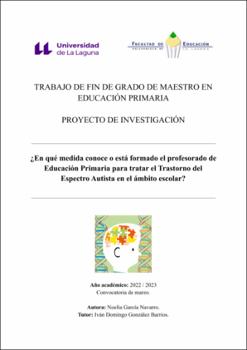¿En qué medida conoce o está formado el profesorado de educación primaria para tratar el trastorno del espectro autista en el ámbito escolar?
Autor
García Navarro, NoeliaFecha
2023Resumen
Este trabajo de fin de grado es una investigación que tiene como temática principal el
trastorno del espectro autista. El Trastorno del Espectro Autista es una afección cada vez
más común pero a su vez de la que se tiene aún mucha desinformación a nivel social. Por
ello es necesario conocer bastante más cuál es el orígen del trastorno, cómo podemos
intentar comprender mejor este mundo y a las personas que lo padecen con un único
objetivo, la inclusión. Uno de los aspectos más importantes a tener en cuenta y el
verdadero móvil de esta investigación es el nivel de conocimiento por parte de los
docentes de educación primaria acerca de este padecimiento. ¿Cuál es la calidad de la
educación que han recibido estos docentes?, ¿Están formados correctamente para saber
tratar este trastorno? Al fin y al cabo, los docentes se convierten en el principal apoyo de
estos niños/as en las escuelas y para ello deben saber lidiar de la mejor manera posible
con cualquier complicación, imprevisto o dificultad que pueda surgir en el aula.
El objetivo principal de esta investigación es conocer la medida en la que el profesorado
de Educación Primaria está formado para tratar el espectro autista. Por lo tanto la
investigación o recabación de datos se realiza en el primer trimestre del curso escolar
2022-2023, en el colegio Echeyde III, en el sur de la isla de Tenerife, más concretamente
en el municipio de Arona. El medio elegido para llevar a cabo dicha investigación ha sido
un cuestionario, el cual han contestado un total de 12 docentes.
El análisis de los resultados revela que el profesorado de primaria del colegio Echeyde III
que ha contestado este breve formulario (con alguna que otra excepción) tiene
conocimientos base acerca de qué es el trastorno del espectro autista. Cabe destacar que
aunque haya especialistas formados para tratar de una manera más específica a este
alumnado, nunca está de más que el resto de profesorado, sea con fuera su especialidad,
tenga conocimientos o herramientas base para tratar de darle de la mejor manera posible
una educación de calidad a este alumnado. This final degree project is an investigation whose main team is autism spectrum disorder.
Autism Spectrum Disorder is an increasingly common condition, but at the same time
there is still a lot of misinformation on a social level. For this reason, it is necessary to
know much more about the origin of the disorder, how we can try to better understand
this world and the people who suffer it with a single objective, inclusion. One of the most
important aspects to take into account and the real motive for this research is the level of
knowledge on the part of primary school teachers about this condition. What is the quality
of the education that these teachers have received? Are they properly qualified to know
how to treat this disorder? After all, teachers become the main support for these children
in schools and for this they must know how to deal in the best possible way with any
complication, unforeseen event or difficulty that may happen in the classroom.
The main objective of this research is to know how much Primary Education Teachers are
taught to deal with the autism spectrum. Therefore, the research or data collection is
carried out in the first quarter of the 2022-2023 school year, at Echeyde III school, at
south of Tenerife island, more specifically in the municipality of Arona. The means
chosen to carry out this research has been a questionnaire, which has been answered by a
total of 12 teachers.
The analysis of the results reveals that the primary teachers of the Echeyde III school who
have answered this brief questionnaire (with the occasional exception) have basic
knowledge about what autism spectrum disorder is. It should be noted that although there
are specialists taught to treat these students in a more specific way, it never hurts for the
rest of the teachers, regardless of their speciality, to have basic knowledge or tools to try
to give these students a quality education in the best possible way.





